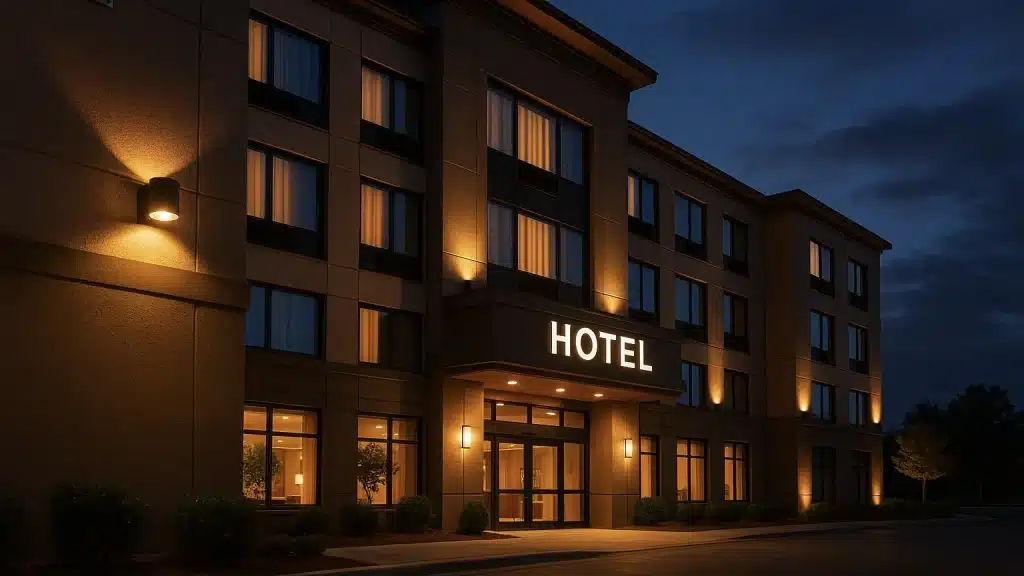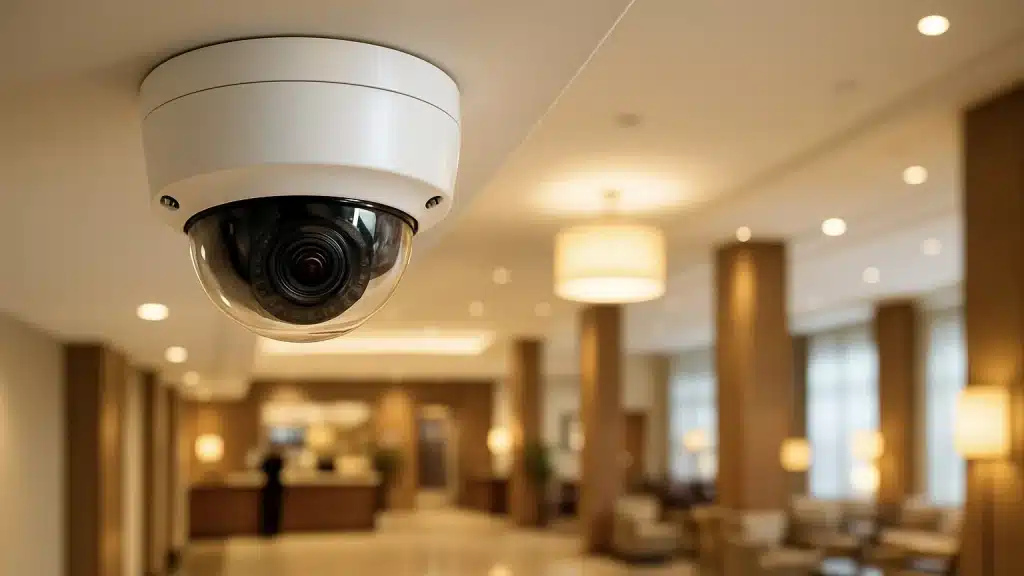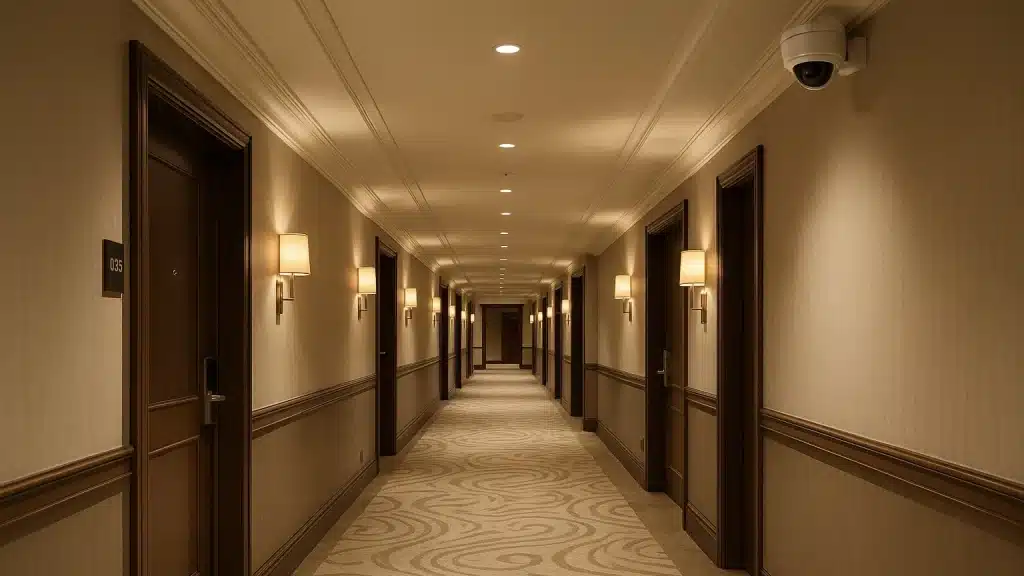Hotels are a home away from home, where guests expect comfort, privacy, and safety. Moving into 2026, security is more important than ever, with rising guest expectations and increasingly complicated threats. This article looks at the best practices for modern hotel security, from surveillance and access control to emergency planning and staff training, to help hotels protect guests, staff, assets, and their overall reputation.
Key Takeaways
- Hotel security systems are essential for guest safety, protecting hotel and guest assets, and building a good reputation. Recent shooting incidents highlight the need for well-developed security plans and systems in the hospitality industry.
- Hotel security systems should be multi-layered, relying on a mix of technology and human intervention for the most well-rounded approach.
- Hotels must always ensure they are following privacy regulations and best practices when implementing new technologies, both for compliance and to ensure guests feel respected and comfortable during their stay.
Why Hotel Security is Important for 2026

The hospitality industry has unique challenges: open public access, high guest turnover, complicated layouts, and 24/7 operations. With today’s high expectations, guests rely on hotels to provide a secure environment, both physically and digitally. A single incident can damage a hotel’s reputation through negative reviews, legal risks, or loss of guest trust.
Strong security programs protect people, property, operations, and hotels’ brands. Real-life events show the importance of strategic prevention, rapid response, and planning in hospitality environments:
- Four Seasons Hotel (Atlanta) Shooting (2024): A man, who appeared to be experiencing a mental health crisis, shot at responding police from inside his hotel room. He was armed with a handgun, shotgun, rifle, and other weapons. The hotel’s surrounding area was ordered to shelter-in-place until the standoff was resolved.
- Days Inn Motel Phoenix Shooting (2022): A man staying at a motel in Arizona was dressed in tactical gear when he opened fire into the motel’s parking lot, killing 2, and threw a Molotov cocktail towards a nearby building. Two police officers were injured in their response before taking the shooter down.
- Las Vegas shooting (2017): In one of the largest mass shootings in U.S. history, a man fired into a music festival from his room in the Mandalay Bay hotel, killing 59 and injuring over 400 others. The shooter had stockpiled firearms and moved them all into the hotel over the course of several days.
Security Challenges in Hospitality

The hospitality industry has a unique set of security challenges that require a balance between comfort and security. Hotels are often big with complex layouts: With all of their stairwells, back-of-house areas, service areas, and multiple floors, blind spots can develop. Hotels must manage guest and staff movement across their property, including parking facilities, storage areas, and staff-only zones, while ensuring only authorized people can access restricted areas.
Hotels are full of people, from staff who know the hotel like the back of their hand to one-night guests. When an incident occurs, whether it’s a natural disaster, fire, theft, or an active shooter, emergency coordination is the key to a swift response. The hospitality sector must be prepared for all threats; by addressing challenges early, hotels can protect their reputation and enhance the safety and satisfaction of everyone on the site.
Unfortunately, hotels typically have staff limitations due to their size. In response, many modern hotels are introducing advanced technologies, including mobile access control systems, AI-enhanced security cameras, and biometric authentication. These solutions allow management to monitor the property in real time while directing their attention to other matters.
Balancing Hotel Security with Guest Comfort
Of course, all of this must be done without compromising guest comfort. Too many visible security measures can decrease guest comfort and make people feel like they have no privacy. On the other hand, if security is too relaxed, everyone and everything is left vulnerable to threats. Hotel security should always:
- Enhance Guest Safety: Modern hotel security centers around guest safety. Strong security systems and plans are critical for detecting threats and responding quickly, so guests experience minimal disruptions. Ongoing staff training creates a strong culture of safety.
- Protect Hotel Assets: Hotel security helps prevent theft, vandalism, and other criminal activities; reduces insurance premiums through risk mitigation; enables quick responses to aggressive behavior; and prevents property damage. Special security for storage rooms and offices is needed to protect valuable assets. Video footage can be used as evidence for investigations, police, and insurance claims.
- Boost Guest Confidence: Visible security improves guest safety perception and satisfaction. Strong protocols often lead to positive reviews and repeat business.
Modern Hotel Security System Components

Modern hotel security systems are multi-layered and combine many elements to keep the hotel safe and secure. These include:
- Risk assessments to identify potential threats or vulnerabilities.
- Physical security measures, like surveillance cameras, access control systems, intrusion detection and alarm systems, and trained security personnel.
- Emergency Notification Systems (ENS) for communication during incidents.
- Emergency Plans for coordinated responses in a crisis.
- Staff training on security procedures and emergency responses.
All of these work together to create an environment where guests feel safe and security teams can respond quickly to threats.
Risk Assessments
Risk assessments are a routine part of any hotel security system. These assessments help identify areas on the premises that might be more susceptible to threats. By doing this proactively, any vulnerabilities can be addressed before they are exploited.
Surveillance Cameras

Surveillance cameras are the backbone of modern hotel security systems. Bullet, PTZ, and dome cameras are commonly used in hotels for high-quality footage and offer a visible deterrent effect. They provide real-time monitoring and can facilitate a quick response to incidents. High-quality surveillance cameras may be able to significantly reduce crime, and they can be a useful tool in investigations.
Additionally, traditional surveillance cameras can be enhanced with object recognition technology, like AI gun detection, to proactively and continuously scan footage for threats. When a firearm is detected and verified by a person, security protocols (e.g., locking doors, setting off alarms, and sending emergency communications) can be automated.
To get the most out of surveillance cameras in hotels, they should be placed in high-traffic areas, including entrances and exits, common/shared spaces, parking lots and garages, stairwells, and other non-private spaces.
Access Control Systems
Access control systems secure hotels by making sure no unauthorized people can enter places they don’t belong. These are especially important at each entry point, in restricted areas, outside guests’ rooms, elevators, and certain stairwells.
Many modern hotels have started using advanced technology for guest room locks. These range from digital keys on guests’ smartphones to biometric access control systems. These are secure alternatives to traditional key cards.
Alarm Systems
Hotel alarm systems are another layer of security in hotels, providing an immediate defense for guests and property. They are critical for detecting threats such as fires, unauthorized entry, and mechanical issues quickly. Smart sensors provide real-time alerts, like smoke detection or unusual temperature fluctuations, so situations can be resolved quickly.
A reliable alarm system is priceless in high-pressure moments, saving lives and minimizing damage through immediate automated notification.
Mass and Emergency Notification Systems (ENS)
Mass and Emergency Notification Systems (ENS) are essential for rapid crisis communication. In hotels, ENS can alert staff and guests about emergencies via in-room phones, apps, texts, PA systems, and digital signage. These systems disseminate coordinated instructions (such as evacuation routes or shelter orders) to minimize panic, guide immediate actions, and protect everyone.
Emergency Plans
Emergency planning is a must. Hotels need clear emergency plans outlining evacuation, first aid, communication, and staff roles to ensure a coordinated crisis response, minimize risk, and protect people and assets during incidents.
Technology, like mobile access to security footage, helps crisis management by allowing security teams to find information quickly, coordinate, and communicate in real time. This speeds up decision-making and reduces damage.
Regular training and drills reinforce preparedness so staff can respond with confidence. When everyone feels prepared, hotels become more resilient and safe.
Ongoing Training for Security Personnel and Hotel Staff
Regular, targeted security training, including emergency response and first aid, is essential for all hotel staff.
A strong hotel security system relies on well-trained staff, as human awareness and intervention are the most critical factors for security’s success. Comprehensive programs teach security protocols, threat recognition, and incident response. Regular cyber awareness exercises also strengthen preparedness.
Ongoing drills ensure preparedness in the face of a crisis. Empowering staff to report unusual behavior can help to mitigate threats, like workplace violence. By combining training, preparedness, and vigilance, hotels create a safer environment for everyone.
Guest Security, in and Beyond the Guest Room

Hotels must put guests first. This means having secure rooms, well-lit public areas, and reliable life-safety devices. Electronic locks, in-room safes, smoke detectors, and maintained alarm systems make guests feel safe and secure during their stay.
Guests also benefit from clear instructions on safety features, like emergency exits and evacuation routes. Simple guidance like reminding guests to use built-in door locks, store valuables in safes, and sweep rooms upon entry can make a big difference in security outcomes.
Regular security audits and staff training keep everything up to date and compliant with privacy regulations.
Hotel Management and Security Integration
Integrated systems allow hotel management to monitor multiple systems from one place. Central dashboards show live camera feeds, access logs, alarms, and incident reports. Cloud-based solutions offer remote access from mobile devices, making it easier to manage security across multiple properties or after hours.
Artificial intelligence enhances monitoring by detecting anomalies and predicting potential threats before they arise. These tools also help with streamlining operations, increasing efficiency, and giving guests a more personalized experience.
Working with Local Authorities
Building relationships with local police, fire, and emergency services helps with emergency preparedness and response times. Hotels that have open communication with first responders can get help faster in an emergency and guidance on how to prevent threats.
Legal and Ethical Regulations for Hotel Security
Hotels must follow strict legal and ethical guidelines to keep guests safe and respect their privacy. This means complying with laws that govern surveillance, data protection, and transparency with guests. For example, surveillance cameras can’t be installed in guest rooms or private areas… doing so is illegal and a huge breach of privacy. Hotels must also follow state, national, and sometimes international data protection regulations, like the California Consumer Privacy Act (CCPA) or the EU’s General Data Protection Regulation (GDPR), to protect guest data.
Privacy Laws
When installing security cameras, hotels must follow all local and national privacy rules. Generally, this means that:
- Cameras can only be placed in public or shared spaces, such as lobbies, hallways, entrances, and parking areas.
- Clear signage must be posted to let guests and staff know that the area is being monitored.
- Hotels must understand and follow local laws about recording, storing, and deleting footage.
- Installing cameras in private areas, such as guest rooms, bathrooms, or changing rooms, is strictly prohibited and can lead to severe legal penalties and long-term damage to a hotel’s reputation.
Data Protection
Data protection laws like GDPR and CCPA require hotels to keep guest information safe. This includes protecting reservation systems, payment data, and personal details. Strong cybersecurity defenses, staff training, and clear communication about how guest data is used all help reduce risks and build trust.
Transparency with Guests
Being open about safety and security measures is a big part of building trust. When hotels explain how they keep guests safe, such as through surveillance in public areas, trained security staff, and well-designed safety features, guests feel more comfortable. Many security measures can also be integrated discreetly into the building design, providing protection without disrupting the guest experience.
When guests feel informed and secure, they are more likely to return, leave positive reviews, and recommend the hotel to others. Transparency supports safety and strengthens guest loyalty.
Final Thoughts

Hotel security is about balance. A successful approach combines advanced technology, trained staff, legal compliance, and meaningful guest communication. By integrating modern surveillance, secure access control, emergency planning, and cloud-based management tools, hotels can protect their guests, staff, property, and reputation. A safe environment enhances the guest experience, builds trust, and makes people feel truly at home during their stay.
Omnilert offers a wide range of security solutions for hotels, ranging from emergency notification systems (ENS), gun detection technology that can be integrated into security cameras, and physical security automation. To learn more, click here to learn more about our Hospitality Security Solutions.
Hospitality & Hotel Security Solutions
Frequently Asked Questions (FAQs)
Why is hotel security important in 2025?
Hotel security is important in 2025 because hotels are facing more complex risks, from physical to cyber, and guests expect a higher standard of safety. With large, open layouts and constant foot traffic, hotels need strong systems to protect guests, staff, assets, and their reputation. Modern security measures help prevent incidents, reduce liability, and build guest trust.
What are the key elements of a modern hotel security system?
A modern hotel security system has several layers: risk assessments, high-quality cameras, access control, alarms, life safety devices, emergency notification systems, clear emergency response plans, and ongoing staff training. Together, these layers create a safer environment where threats can be minimized quickly.
How do hotels balance strong security with guest comfort?
Hotels balance security and comfort by using well-placed, discreet security measures that protect guests without making them feel watched or restricted. This is done with intelligent camera placement, subtle access control, and staff training to handle issues calmly and professionally. When done right, security enhances comfort by making guests feel safe away from home.
What are the legal restrictions for hotel surveillance systems?
Hotels must follow strict privacy laws when using surveillance. Cameras can only be placed in public areas like hallways, lobbies, entrances, and parking lots. They can’t be installed in private spaces such as guest rooms or bathrooms. Hotels must also post signs about monitoring, comply with recording laws, and protect stored footage. Violating these rules can result in serious legal penalties.
How does staff training improve hotel security?
Staff training is one of the most important parts of hotel security. Well-trained employees know how to spot suspicious behaviour, respond to emergencies, protect guest data, and communicate clearly during incidents. Regular drills, cybersecurity training, and clear reporting procedures create a culture of vigilance, ensuring that both staff and guests stay safe.



